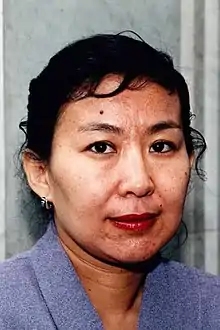Aigul Kemelbayeva | |
|---|---|
 | |
| Native name | Айгүл Кемелбаева |
| Born | 1965 (age 57–58) Kundyzdy, Kazakhstan |
| Occupation | Writer of prose and literary criticism |
| Language | Kazakh |
Aigul Zholdasbaevna Kemelbayeva (born 1965; Kazakh: Айгүл Жолдасбайқызы Кемелбаева) is a Kazakh writer of prose and literary criticism, considered an important member of the post-independence literary generation in Kazakhstan.
Early life and education
Aigul Kemelbayeva was born in 1965 in the village of Kundyzdy, in the region of Semey, Kazakhstan.[1][2][3] She began writing at a young age, producing her first novel, A Journey to the Seventh Continent, at age 15, which came second in a national youth literary contest.[4]
After graduating from Al-Farabi Kazakh National University with a degree in journalism in 1987, she attended the Maxim Gorky Literature Institute in Moscow, graduating in 1994.[1][2][3]
Career
Kemelbayeva is now based in Nur-Sultan.[1] She is best known for her work as a Kazakh-language writer, primarily of short stories, which have been published in such literary magazines as Zhuldyz.[1] She has also written several books of prose and essays.[2]
Her 2002 book Munara ("The Tower") was published in 2002.[4] It contains two novellas, The Nanny and The Last Tiger.[4] The Nanny is a semi-autobiographical story of a Kazakh student in Moscow immediately after the collapse of the Soviet Union.[5] It is considered a landmark work, the first such work written by a Kazakh woman that goes beyond the socialist realist conventions that characterized prior Kazakh literature.[5] As part of a "new tide" of intellectual prose in Kazakh literature following the nation's independence in the early 1990s, her writing has been hailed as bringing a "new artistic quality" to the genre by fusing European literary styles.[6][7] She is also considered one of the first Kazakh literary writers to discuss issues of gender.[8]
In addition to The Tower, her books include 2001's Tobylgysai, 2013's Mazhnun's Heart, and 2016's Soz Hikmet.[4] Her story "Kôkenaj and Ķalķaman" was included in English translation in the 2019 anthology Contemporary Kazakh literature. Prose.[9]
Kemelbayeva is also a literary critic, having produced more than 200 articles on the subject.[1] She has served as head of the literature department at the Kuanyshbayev State Academic Kazakh Music and Drama Theater.[4] In 2005, she co-wrote the Bolat Sharip film Kunya ("The Holy Sin"), based on a story by Magzhan Zhumabayev.[2][10] She has also worked on scripts for the documentaries Sultan Orazalin (2013), Suleiman Eskarayev (2012), and Zhiembet zhyrau (2014).[4]
Her various literary awards include the Daryn national youth literature award in 2000.[2][3]
References
- 1 2 3 4 5 "Aigul Kemelbayeva". Words Without Borders. Retrieved 2022-03-23.
- 1 2 3 4 5 "Kemelbayeva Aigul". Literary Portal. Retrieved 2022-03-23.
- 1 2 3 "Kemelbaeva A." East Kazakhstan: famous names. 2020-05-14. Retrieved 2022-03-25.
- 1 2 3 4 5 6 Abilda, Aizhan (2018-08-15). "About Aigul Kemelbayeva's novel 'The Tower'". Literary Portal. Retrieved 2022-03-23.
- 1 2 Batayeva, Shelley; Fairweather-Vega, Zaure (January 2018). "Writing by Kazakh Women". Words Without Borders. Retrieved 2022-03-23.
- ↑ Sultangaliyeva, Rita Bekzhanovna; Ramanova, Aigul Abibullaevna; Sergazyieva, Lilia Amanbaevna; Kaliyev, Aibek Kyikbaiuly (January 2016). "Kazakh Short Stories at the Period of Independence Years: New Artistic and Ideological Searches" (PDF). Man in India. 96 (7).
- ↑ Jakipova, Gulsana; Beisenova, Zhainagul (March 2021). "A New Intellectual Tide in Kazakh Literature". Cross-Cultural Studies: Education and Science. 6 (1).
- ↑ "Central Asian Literature, and How It Is Treated". Overachiever Magazine. 2019-05-27. Retrieved 2022-03-23.
- ↑ Kazakhstan; Cambridge University Press; National Bureau of Translations (Kazakhstan), eds. (2019). Contemporary Kazakh literature. Prose. Kazakhstan : [Cambridge, England]: Ūlttyq audarmalar bi͡urosynyn͡g qoghamdyq qory (Public Foundation National Bureau of Translations) ; Cambridge University Press. ISBN 978-601-7943-60-8.
- ↑ "New Films from New Kazakhstan: "Kunya"". Stanford. 2013. Archived from the original on 2019-03-12.